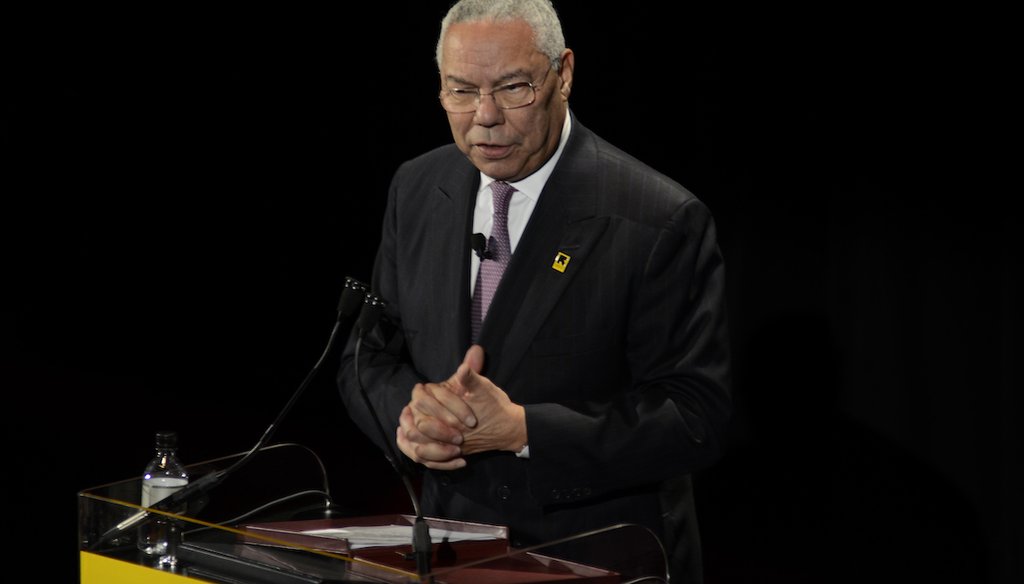Stand up for the facts!
Our only agenda is to publish the truth so you can be an informed participant in democracy.
We need your help.
I would like to contribute

Former Secretary of State Colin Powell speaks at the International Rescue Committee Freedom Award Dinner at The Waldorf Astoria Hotel in New York, Nov. 9, 2011. (AP)
Colin Powell, the retired general and diplomat with a legacy of breaking barriers during his military and civilian careers, died Oct. 18.
In a brief statement posted on Facebook, Powell’s family said the cause of death was complications from COVID-19, noting that he had been fully vaccinated.
Powell spent 35 years in the U.S. Army, during which he served as President Ronald Reagan’s national security adviser and later chairman of the Joint Chiefs of Staff under President George H.W. Bush, the first Black American to hold those posts. He retired in 1993 as a four-star general and briefly considered a run for president. As secretary of state under President George W. Bush, he helped make the administration’s case in the United Nations for intervention in Iraq, ahead of the U.S. invasion in 2003.
Powell is one of the most prominent American leaders to die from COVID-19. And within hours of the family’s announcement, Fox News host John Roberts and social media users on Twitter and Instagram seized on the news of his death to claim that it raised questions about the efficacy — or even the risks — of the vaccines, which have been shown to sharply reduce the risk of dying from COVID-19. Fox News host Tucker Carlson claimed on his show that the deaths of Powell and other vaccinated people mean "you’ve been lied to" about the vaccines.
Such claims ignore important context about how COVID-19 affects people with immune deficiencies and other conditions that predispose them to serious disease, and what the scientific data say about the efficacy of the vaccines.
Powell’s infection was what researchers call a "breakthrough" case — a COVID-19 infection that occurs despite a vaccination. Public health officials have been clear that since no vaccine is 100% effective, breakthrough cases are expected to occur with even the most successful vaccines. While COVID-19 vaccination sharply reduces the risk of hospitalization or death from a breakthrough case, it doesn’t entirely eliminate it.
As of Oct. 12, more than 187 million people in the United States had been fully vaccinated against COVID-19, according to the U.S. Centers for Disease Control and Prevention. In that period, the agency said, there were 7,178 patients with breakthrough infections who died, or fewer than 0.004%. (That figure includes nearly 1,000 people who were asymptomatic or died of causes unrelated to COVID-19.) The vast majority of the deaths were among people age 65 or older.
Powell was 84 years old, and had long been battling Parkinson’s disease and multiple myeloma, a blood cancer that diminishes the body’s immune system and, in turn, the potential effectiveness of vaccines.
Fewer than 3% of people in the United States are immunocompromised in some way, and while the vaccine boosts their protection against COVID-19, they "may not build the same level of immunity to 2-dose vaccine series compared to people who are not immunocompromised," the CDC says.
According to a study cited in a July CDC report, 44% of breakthrough cases requiring hospitalization in the U.S. involved immunocompromised people.
That’s why the CDC recommends that people with moderate to severe immune deficiency receive a third dose of the Pfizer or Moderna vaccine about 28 days after their second dose.
RELATED VIDEO
CNN reported that Powell had gotten two doses of the Pfizer vaccine, but fell ill before he was scheduled to get his third shot last week.
By itself, Powell’s death from COVID-19 was not cause to question the effectiveness of the vaccines for most people, said Carlos del Rio, distinguished professor of medicine in infectious diseases and executive associate dean for the Emory University School of Medicine.
Vaccines "work extremely well to prevent severe disease and death from COVID-19, but no vaccine is perfect," del Rio said.
"Older and immunocompromised persons have a weak immune system and are less likely to be protected," he said. "This is why we need to vaccinate everyone. That is what the concept of ‘herd immunity’ is about."
Our Sources
General Colin L. Powell Facebook page post, Oct. 18, 2021
Department of State Office of the Historian, Biographies of the Secretaries of State: Colin Luther Powell (1937–2021), accessed Oct. 18, 2021
John Roberts, archived Twitter post, Oct. 18, 2021
Twitter post, Oct. 18, 2021
Instagram post, Oct. 18, 2021
Media Matters for America, Tucker Carlson claims Colin Powell's death proves "you've been lied to" about vaccine effectiveness, Oct. 18, 2021
CNN, Colin Powell, first Black US secretary of state, dies of Covid-19 complications amid cancer battle updated Oct. 19, 2021
The New York Times, Colin Powell, whose immune system was weakened, died of COVID-19 after fighting cancer, Oct. 18, 2021
Centers for Disease Control and Prevention, COVID-19 Vaccine Breakthrough Case Investigation and Reporting, Oct. 18, 2021
Centers for Disease Control and Prevention, COVID-19 Vaccines for Moderately to Severely Immunocompromised People, Oct. 8, 2021
CNN, Why Colin Powell's cancer likely reduced his protection from the Covid-19 vaccine, Oct. 18, 2021
Centers for Disease Control and Prevention, ACIP Data and clinical considerations for additional doses in immunocompromised people, July 22, 2021
Email interview with Carlos del Rio, distinguished professor of medicine in infectious diseases and executive associate dean for the Emory University School of Medicine, Oct. 18, 2021


























